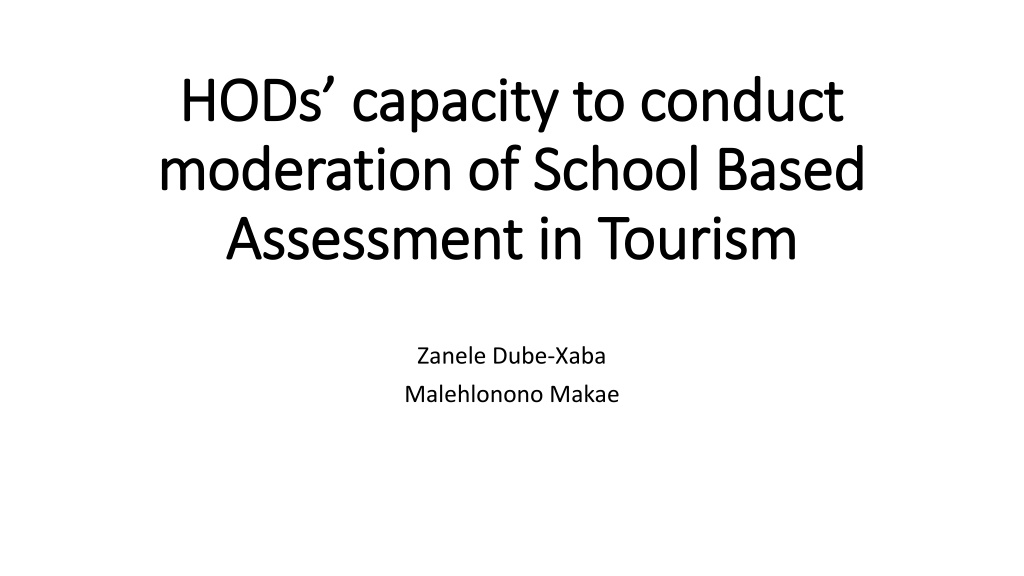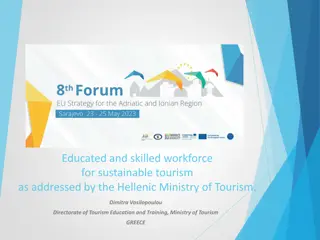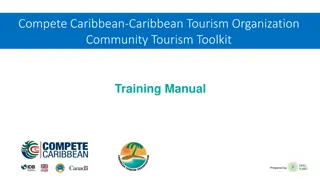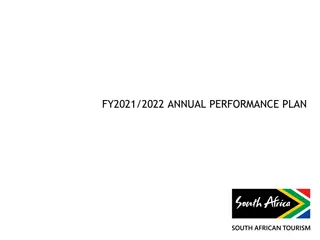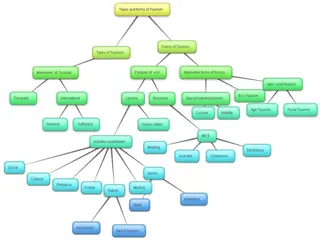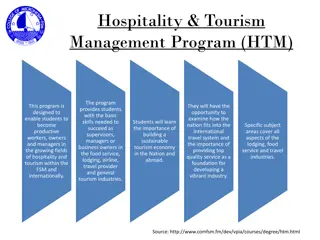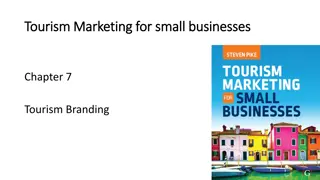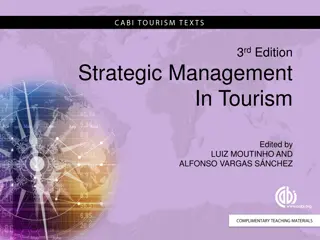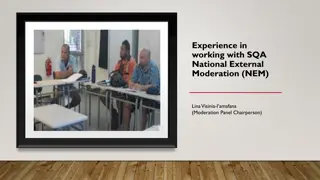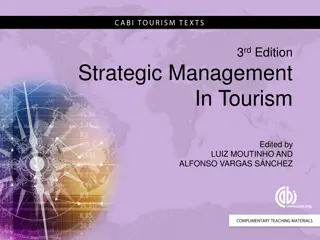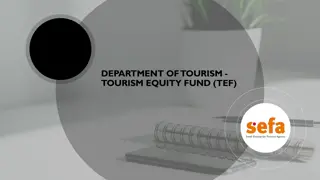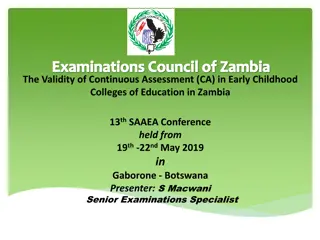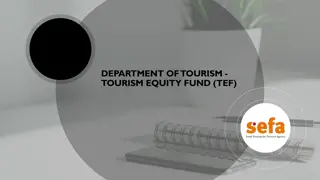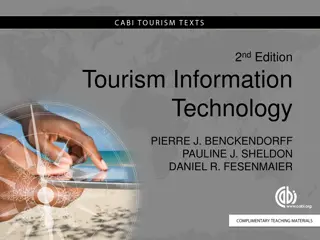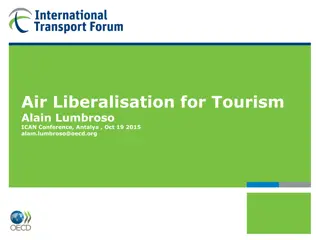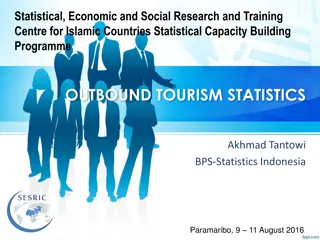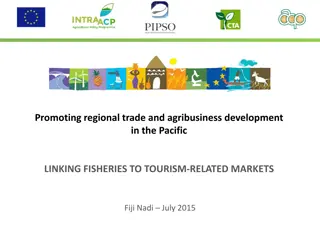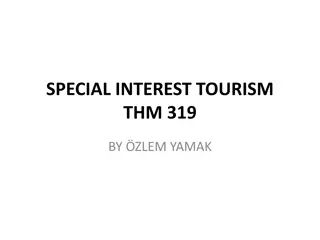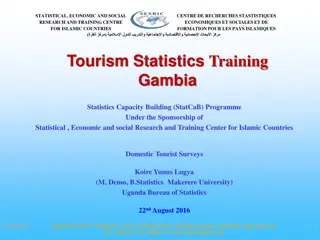Enhancing Moderation of School-Based Assessment in Tourism Education
Tourism education in secondary schools in South Africa has gained prominence due to the industry's economic significance. The National Curriculum Statement emphasizes continuous assessment through School-Based Assessment (SBA) and moderation to ensure fairness and validity. The assessment in Tourism includes various tasks with a significant weighting in learners' progress evaluation. Quality assurance measures, particularly moderation of SBA and Practical Assessment Tasks (PAT), are crucial for maintaining standards.
Uploaded on Oct 04, 2024 | 0 Views
Download Presentation

Please find below an Image/Link to download the presentation.
The content on the website is provided AS IS for your information and personal use only. It may not be sold, licensed, or shared on other websites without obtaining consent from the author. Download presentation by click this link. If you encounter any issues during the download, it is possible that the publisher has removed the file from their server.
E N D
Presentation Transcript
HODs capacity to conduct HODs capacity to conduct moderation of School Based moderation of School Based Assessment in Tourism Assessment in Tourism Zanele Dube-Xaba Malehlonono Makae
Introduction and Background Tourism teaching was introduced within the formal secondary school curriculum as a consequence of increasing economic contribution of the tourism industry to the private and public sectors (Dube, 2014; Hsu, 2015; Mayaka & Akama, 2015). Post-apartheid South Africa: lacked of skilled human resource; major unemployment rate. Strategy to address these issues: introduce more vocationally orientated subjects (Chili, 2013). Tourism has become one of the popular choice subjects in secondary schools (Dube, 2014; Shalem & Allais, 2014) Although Tourism as a subject is drawn from a variety of fields (Tribe & Airey, 2008), its content embeds the industry practice which reflects situations and vectors of influence likely to be found in the real-world setting thus investigating the real-life context. Hence teaching, learning and assessment in Tourism is crucial.
Introduction and Background National Curriculum Statement: recommends a change in assessment practices which requires schools to put more emphasis on continuous assessment as an integral part of the learning, teaching and assessment school-based assessment (SBA) component was introduced in the National Senior Certificate Examination. SBA is a formal and important part of the evaluation process of all South African learners in Grades R-12 (Van der Berg & Shepherd, 2008) Alongside the introduction of new assessment practices including the SBA, quality assurance measures were put in place. Moderation of assessment is one of quality assurance measures performed in order to uphold principles of assessment such as fairness, reliability and validity.
Introduction and Background CAPS suggests seven tasks for continuous assessment in Tourism. SBA (six tasks) and year end examination (written examination and PAT). Final mark: SBA contributes 25%;end of the year exam contributes 75% (Practical Assessment Task (PAT) is 25% and the year-end written examination is 50%). In Grades 10 and 11 all assessment task (SBA, PAT and written exam) are internally set, internally marked and internally moderated. In Grade 12 SBA tasks are internally set, marked and externally moderated; PAT is externally set, internally marked and externally moderated; and written exam is externally set, externally marked and externally moderated. SBA and PAT holds a significant weighting in determining the progress of the learners in Tourism. Therefore, moderation of SBA and PAT needs to be moderated for rigorous controlled and quality assurance (Poliah, 2014).
Introduction and Background Policy gives a clear guideline regarding the number of assessment tasks and forms of assessment to be used it is silent on the quality of these tasks. The subject teacher determines how and what to assess content knowledge and skills in Tourism. The quality of these tasks depends on how each individual Tourism teacher perceives as good standard and quality. Thus quality assuring through internal moderation is crucial. The question of how schools were dealing with moderation at school level, which is the role of the HOD as an instructional curriculum leader, is at the heart of the practice of assessment and quality assurance at schools. Hence this study examines the capacity of HODs in conducting moderation of SBA through the lens of Tourism.
Purpose and Rationale Very limited research has been done on the tourism subject in South African secondary schools (Van Niekerk & Saymaan, 2013; Chili, 2013, 2014; Dube, 2014, 2016; Dube-Xaba, 2017). According to Chili (2013) there is a total disquiet with literature on Tourism in South African secondary schools. Moreover There is not enough research focusing more on assessment in secondary, particularly moderation of SBA in Tourism. This study is aimed to fill that gap by examining the capacity of HODs in conducting moderation of SBA in Tourism
Methodology Intepretive qualitative case study design which would allow us to understand and attach meaning of the phenomenon HODs capacity to conduct SBA moderation in Tourism as argued by Edmonds & Kennedy (2013) Qualitative inquiry is known for its emphasis on meanings that people attach to their own experiences (Betrum & Christiansen, 2014) Convenience sampling was used to identify the cluster- easily accessed Purposive sampling: All four schools offering Tourism in the cluster were selected Four HODs (one HOD per school): managing Tourism Data was generated through semi-structured face-to-face interviews
findings HODs lack training in Moderation The HODs were aware of the role they have to paly in conducting SBA moderation however they were uncertain due to inadequate training Most of the HODs in the sample were not provided with any training regarding to the moderation of SBA tasks I was not trained to conduct moderation especially for the subjects I am not a specialist on like Tourism which is a bit complex for me because it covers a number of subjects [HOD 2] I attend moderation sessions and not training only as subject teachers. This is not adequate because I don t deal only with my subject. [HOD 4] HODs were only capacitated as specialists of their subject not as curriculum instructional leaders. Thus they are not capacitated as per the requirements of their posts as argued by Bipath (Year) that in South Africa HODs are appointed and provided minimal mentorship which leads to poor curriculum implementation
Findings The participants further reported that the training they received workshops were either one day or a few hours and was of little assistance in equipping them to conduct moderation in Tourism. I attended a one day workshop where we were orientated with the SMT toolkit and it was addressing a number of issues not assessment only. [HOD2] No training was offered to us about conducting moderation in different subjects that we manage in the one day workshop that I attended. The facilitator did not focus on subjects such as Tourism in which assessment is not the same as in most of the subjects in our school. [HOD1] Moderation is one of the primary roles of the HOD at school level thus they should be capacitated to carry out this role This finding resonate with Maile s (2013) findings that pointed out that in depth training for HODs is needed which extends beyond the two or three days workshop do not capacitate them to conduct effective moderation
Findings The SMT toolkit was given with minimal training I got the SMT toolkit from the deputy principal who attended the workshop but I was not trained on how to use it. The toolkit only gives the forms and there is no guidance on the standards of moderation especially for Tourism which is the only subject in my department with a PAT The Department relies on a cascading approach but it silent on the standards that are required on the assessment tasks
findings Lack Tourism Content Knowledge This study found out that all the HODs for Tourism were not Tourism subject specialist I am not familiar with the content knowledge in Tourism and not to mention the PAT [HOD3] I am a physical science specialist and there is no PAT so moderating the PAT is a challenge because the terminology is difficult so I only do post moderation [HOD2] I cannot spot whether the question is correct or not because of the huge differences in designing test questions in my subject and in Tourism [HOD1] Without demonstrating appropriate subject matter knowledge, it is difficult to assure quality of the tasks and support teachers in designing assessment activities Effective moderation depends on the HODs subject matter knowledge (Motsamai, 2017)
HODs have knowledge of the policy on moderation but seemed to experience challenges when it comes to implementation in Tourism particularly according to the policy, I have to do pre and post moderation but it is difficult to conduct moderation in Tourism because I don t know the content I just rely on what the teacher has set and marked because I don t know the subject and thus provide my signature and school stamp as a sign of approval The focus seem to be on the HODs approval shown by the signature and the school stamp with no room for feedback in terms of quality of the development of SBA and PAT
Conclusion and Implications The study highlighted that HODs capacity to conduct moderation in Tourism was at a very low level. Moderation by HODs is only done for compliance not for quality assurance HODs possess very limited knowledge of moderating SBA and PAT in Tourism because they lack subject content knowledge Lack of capacity on the HODs to conduct moderation in Tourism leads to poor or no support for the Tourism teachers on how to develop quality SBA and PAT tasks The available evidence suggests that attention should be payed to capacity development for HODs as they are mainly responsible for moderation at school level in order to assure quality of SBA. in-service training in the form of team moderation in house workshops for HODs could greatly contribute to upgrading their skills and introducing them to effective Department of Basic Education must devise standards required in moderating SBA and PAT in Tourism
